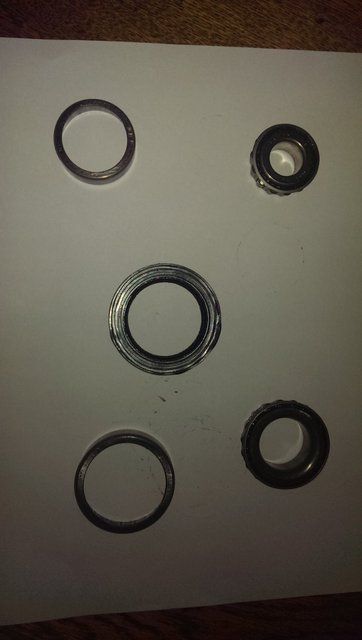Link pin front stub axles are smaller diameter than ball joint.
Smiley


Well after 8 years and quite some time sitting stationary, its no real surprise the '67 has a noisy wheel bearing.
Are all ball joint beam beetle stub axels and wheel bearings the same? I would like to avoid pulling it down before buying the bearings and seal.
Thanks.
this may help you - front and rear bearings pics.....
Make certain you do not buy Chinese bearings, they seam to be supplied every were, look for a brand like Timken, NSK or SKF, they cost a bit more but these will last a lot longer.
Balljoint bearings are not the same as link pin bearings. They are different so make sure you order the correct ones for your bug.
Link pin front stub axles are smaller diameter than ball joint.
Smiley 
Yup, so long as you order for a BJ Beetle you'll be fine. As VW060 said, make sure you buy a quality brand. FAG were one of the main suppliers for VW
so another one to add to NSK etc 
There are two different sizes of ball joint stubs. Early are smaller...and not just the early drum ones.
Even the disc brake ball joint had small and large sizes....yours could be either.
I have even seen a car with different each side, and both disc stub.
| Quote: |

Some early ball joint Beetles used a 40 hp tie rod end, maybe that ties in with the bearing sizing that dangerous mentioned
| Quote: |
Thanks to all for the detail.
Given the 50 / 50 chance of getting it right or wrong. Looks like I'm pulling it down to determine the right bearings and seal.
If this helps at all, this is for my weird Import '67 from South Africa, that may have originated in the UK. So, the first of the Ball joint cars.
However this may have been fitted with an beam / spindles from who knows where.
Are there any identifying marks or part numbers on the spindles that may help?
Also, the images above look like the bearing and race are one. I was expecting conical bearings and a race you drift into the rotor hub. Can anyone
confirm?
Thanks.
I think the stubs with the small tie rods used smaller hex nut, maybe 17mm and the later ones were 19mm
Thanks Steve
yes Steve, generally but not definatively.
The only way to be sure is removal of bearings and check stub IMO (even the TRE hole can be reamed larger, but the stub is pretty hard to make
bigger)
The bearings are tapered roller that have the outer race separate to the caged rollers and inner race.
Thanks Matt.
I will strip it down and post pics of what I find.
OK, so I found some time to pull down the front left rotor and here is what I found.
The spindle has and OD of approx 26.98 at the root and 17.50mm on the outer end.

Seal PN 40589
Koyo Bearing
Inner bearing outer race PN L44610
Inner bearing with inner race PN L44649R
Nachi Bearing
Outer bearing outer race PN LM11710
Outer bearing with inner race PN LM11749

Just take the old bearings and seals to a bearing supply shop and get some good quality replacements. just standard tapered roller bearings.
| Quote: |
 The last NSK ones I got were
The last NSK ones I got were 
And better quality than the last set I saw purchased from a vw supply shop.
| Quote: |
| Quote: |

Ok, so I replaced both left and right bearing sets and seals...... and the noise persists.
Any suggestions on what it might be?
Im certain its coming from the front left, and is more noticeable at +80Kkmh
Speedo cable perhaps? Is it necessary to grease / lube the speedo cable?
Disconnect the speedo cable at the wheel and go for a drive. It's pretty hard to diagnose a noise over the internet. A wheel brg usually changes pitch with load, ie if you turn a corner the loaded side (outside) wheel increases load and should make more noise. I've had rears sound like fronts. You might be tightening the fronts too much, you should have movement in the thrust washer to indicate correct preload. I personally do my wheel brg diagnosing on the hoist by spinning the wheels by hand with a quiet workshop, a bad brg can be felt and heard this way.
| Quote: |

Also, and this depends on the vehicle, I've found that if it's a front bearing then you can feel a slight vibration thru the steering wheel whereas
the rear bearings give a vibration in you butt cheeks. NO joke intended.
Matt is quite right tho that the best method is a quite workshop and the wheels up in the air so you can spin the wheel and listen for any noises.